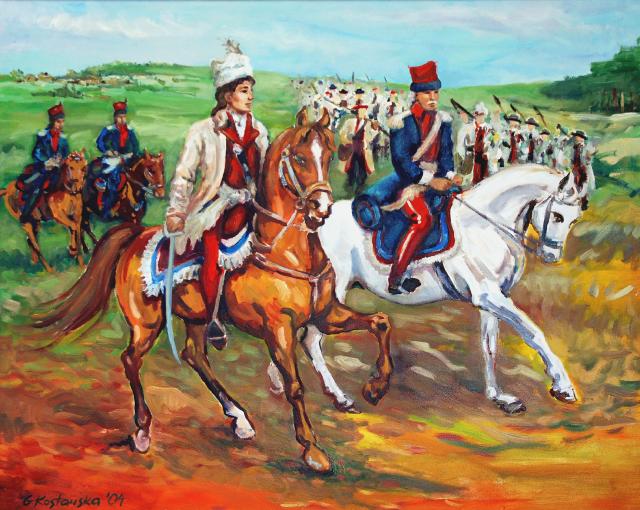| Hallo, Polish youth from Kujawy, Tatry, Polonez, Wielopolska, Lajkonik and other folkloric ensembles. Specially for you an essay about the great Patriot, a faithful friend of Kosciuszko - Julian Ursyn Niemcewicz is being published. He was the oldest of the sixteen children of Marceli Niemcewicz - a Mielnik cup-bearer (an Old Polish noble office). He was brought up in the spirit of chivalry in his grandfather’s house. In 1770 he joined The Cadet Corps in Warsaw. It was there that he received a modern education and came into contact with the main ideas of the Enlightenment. In 1777 he became an aide-de-camp of General Prince Adam K. Czartoryski. His first translations (Voltaire, Henriada etc.) come from this period. He soon went for an educational trip round Europe (1784-85) and became acquainted with its present and past. From then on European trips became a constant part of his life.
He stayed in Puławy and was associated with Czartoryski. Soon, as a deputy to the so-called Four Years' Seym, he became a politician who thought in national categories. He gained supporters through his parliamentary speeches. His political tales circulated anonymously in the capital, and his comedy Powrót posła [The Return of the Deputy] (written in a few weeks and staged in 1791), was regarded as the first Polish political comedy. He presented in it a programme of moderate reforms, reminded his audience of the hereditary nature of the succession to the throne and propounded beautiful, Old Polish virtues.
In the period of the preparation of The Constitution of the 3rd of May he published "Gazeta Narodowa i Obca" - political newspaper. He was an active defender of the Constitution and after its defeat and the Russian army’s invasion he went to Vienna. There he created political pamphlets, for example, Fragment Biblii Targowickiej [A Fragment of the Targowica Bible], which attacked the Targowica traitors.
Soon he went to Florence together with Tadeusz Kościuszko. During the Kościuszko Insurrection (1794) he became a Secretary of its Commander. After the defeat of the rising he spent two years in prison in Petersburg with Kościuszko. In the citadel he translated among other works, for example, Atalia by Racine and The Rape of the Lock by Pope. Tsar Paul I released both prisoners after they had sworn loyalty to him, and presented them with sable furs. Niemcewicz described his prison years in his French diary Notes sur ma captivité à Saint Petersbourg.

Kosciuszko and Niemcewicz on a battlefield. Painted by Grazyna Kostawska |
Niemcewicz sailed together with Kościuszko via Stockholm and London to the United States. There, in Philadelphia, they met President Adams, Vice-president Thomas Jefferson, and also the future king of France, Louis Philippe. Kościuszko soon returned to Europe - to France. Niemcewicz married Zuzanna Livingston and renounced all claims to her inheritance. He travelled, was a guest of George Washington and became his first biographer. He also joined the Philosophy Society in Philadelphia.
He left America twice. In 1807, on the news of the arrival of Napoleon’s army on Polish soil he left the USA for good. In Warsaw he held numerous public, cultural and academic posts. He prepared for Napoleon a secret report about the social and economic situation in the Duchy of Warsaw, which was being formed at that time. During these years he created a cycle of historical and patriotic songs: Śpiewy historyczne [Historical songs], in which he recorded the former glory of Poland.
After Napoleon’s defeat and the creation of the Congress Kingdom of Poland (subordinated to Russia) he remained a member of the moderate opposition. Among patriots he was regarded as a moral authority. He continued his literary work, writing, for example, the first Polish historical novel: Jan z Tęczyna [Jan of Tęczyn].
He welcomed the November Uprising (1830/1831) with some reserve. Together with Count Aleksander Walewski - Napoleon’s son - he tried to gain military support in London.
From the end of 1833 onwards he shared the fate of the Uprising émigrés in Paris. He mainly carried out honorary functions. In 1839 he inaugurated the opening of The Polish Library at Quai d’Orléans on the Ile St Louis. He still meticulously wrote his diary (he published a dozen or so diaries and reports of important events and journeys). The whole set of diaries recorded the historic processes taking place in contemporary Poland, Europe and America. At his funeral in Montmorency he was referred to as "The Man - Poland".
Respected by the Romantics he influenced their sense of patriotism. In the drama “Kordian” by Słowacki he was depicted as the Chairman. He also appears in Zmierzch wodzów [The Twilight of the Leaders] by Berent.
source - literat.ug.edu.pl

Kosciuszko and Niemcewicz - a night chat just before the Maciejowice Battle. By Kasia Wasilewska-Wojtan |

Niemcewicz in Russian prison.By Kasia Wasilewska-Wojtan |
| 

